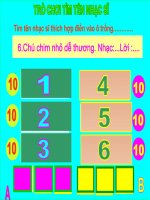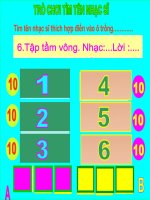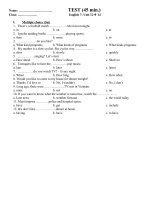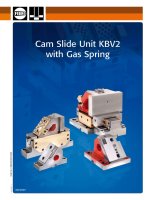Finance 1 slide unit 1
Bạn đang xem bản rút gọn của tài liệu. Xem và tải ngay bản đầy đủ của tài liệu tại đây (12.09 MB, 49 trang )
Jobs in the
finance se
ctor
Que
s
e
p
y
t
stion
UNIT 1
CHOOSING JOB
Why c
h
oose a
s
b
jo
t
n
re
e
iff
d
r
fo
d
e
e
n
u
Skills yo
caree
r in
financ
e
Preparing for an interview and writing a covering letter
Objectives:
After this unit you can...
...talk about what a person does in their job
...talk about where and how they work
...ask a range of different questions about jobs in finance
...discuss what skills and qualities are needed for jobs in finance
...prepare for an interview and write a covering letter
Countdown
1. Read the profile of people talking about their jobs in finance. Match the profiles
a-h with the job 1-8 (P. 4)
a 1. An equity trader
e 2. A customer advisor in a bank
h 3. An insurance broker
g 4. An accountant
b 5. An investment banker
c 6. An auditor
d 7. A company treasurer
f
8. An analyst
2. Work in pairs. Which of the jobs in 1
•
appeals to you the most?
•
requires the longest training?
•
is the most stressful?
•
is the best paid
3. What are you looking for in a job? Which four of these features are most
important to you? Rank the features 1-4 (1= most important)
•
to work in a local company near my home
• to work in a large international company
• to work long hours, but get a big salary
• to have evenings an weekends free
• to work directly with customers and the public
• to work with statistics and tables
• to work with companies’ financial account
• to work on the financial markers
• to have a lot of responsibility early in my career
❏
❏
❏
❏
❏
❏
❏
❏
❏
I think/In my opinion....four most important
features to me when I am looking for the job are...
4. Work in groups of three or four. Explain your choices to your partners and decide
together which of the jobs in 1 would suit each of you the best
The four most important features
to me when I am looking for the
job are.....because.....
We think that ....(job) would suit
you the best
Vocabulary: Describing a job
2. Complete the sentences with the best verbs (P. 5)
In my job I have to....
advise answer serve
advice
1. __________________
customers on their choice of financial products
2.
3.
serve
__________________
customers who need cash or to make payments
answer
__________________
telephone enquiries
analyze forecast set
4.
forecast
__________________
what will happen to consumer demand for the next
twelve months
5.
analyze
__________________ the financial results for last year
6.
set
__________________
a budget for spending in each department
borrow issue lend raise
issue
7. __________________
shares or bonds
raise
8. __________________
capital by issuing shares on the financial markets
lend
9. __________________
money to customers
borrow
10. __________________
money from the banks in short –term loans
investigate manage. prepare
prepare
11. __________________
the accounts at the end of each quarter
investigate
12. __________________
the accounts to check for accuracy
manage
13. __________________
the cash in our current accounts.
3. Using the verbs in the boxes below, complete the two job adverts from an internet
website for financial recruitment (P. 5)
advise lend answer borrow investigate
manage prepare serve
An exciting opportunity has arisen at one of the UK’s largest banks within a lively call
center environment on the inbound I outbound customer service department.
serve
As a customer relationship trainee, you will have to 1_______________
, customers
answer
who want to carry out transactions, 2_______________
questions, and
3
advise
_______________
them on the right products to suit their needs. The work involves
borrow
making quick decisions about customers who want to 4_______________
money on
lend
their credit cards and deciding who to 5_______________
money to by using our
credit check systems. NO COLD CALLING INVOLVED! !
prepare
Supporting our marketing division, you will have 6_______________
reports on
investigate customer complain 8_______________
manage
internal errors and 7_______________
a
database of customer usage.
Previous call center / sales experience is preferred, but not essential, as full training
is provided.
If you are interested in the above role, please call immediately on 0234 326 7635.
advise
manage
raise
set
International opportunities for young graduate accountants to train in a
multinational accountancy team.
Working in Sao Paulo, Brazil, you will be responsible for advising international
companies on their operations in the country. Key tasks include presenting
solutions to clients on
manage
how to 9_______________
cash flow more efficient
raise
how to 10_______________ capital from the banks
set
how to 11_______________
11 budgets and implement
systems
advise
how to 12_______________
clients on better ax p a g.
It’s my job
If you own shares (UK) or stocks (USA),you own a
part of a company and 'share' in its profits when they
pay dividends. Traders buy and sell shares on stock
markets or equity markets like Wall Street.
If you own bonds, you own a part of a government or
company's debt. Bonds usually pay a fixed interest,
the yield, for example, for ten years.
Which investment is safer? Which do you think gives
the best long-term return?
1. Look at the list of qualities that could be important to work in financial markets.
Mark them VI (very important), Q1 (quite important), or NI (not important).
Then compare your answers in pairs. (P. 6)
1.
having a lot of experience in business or finance
________ ❏
2.
being able to get on well with your clients
✓ ❏
________
3.
being good at working in a team
________ ❏
4.
being good at socializing
✓ ❏
________
5.
being good at listening to and remembering information
✓ ❏
________
6.
being able to think quickly
✓ ❏
________
7.
being good at taking risks
________ ❏
2. Now read an interview with Jilly Atkins, a bond trader who works in the debt
markets, buying and selling government debt. Tick (✓) the qualities in 1 that she
mentions
Jilly Atkins
Before you got your job, did you study business or finance at college?
No, actually, I didn't. In fact, when I applied for my first job, I really had no experience in
finance. I just looked on the Internet to see which finance jobs paid the best. I saw that
as a bond trader you could earn £100,000 after only two years in the job. So I decided
that was the job for me!
What skills and qualities were they looking for?
I hope I impressed them. You definitely need good personal skills in this job because
everything depends on contacts. You have to be good on the telephone so people want
to call you with a deal. But it's not only in the office. If you want to make a lot of money,
you also have to socialize and network with clients at night. That means lots of eating in
restaurants. That's where you hear the best news. You're always competing with other
banks for the same business so you have to keep the clients very happy. It's fun, but
hard work.
It's a very demanding job. Do you work a long day?
Yes, I do. We start work every day at 7.00 a.m. We have to go to the morning
briefing, when the analysts tell us about information in the news that is important
for prices. Then the head of the division explains the strategy for the day. We begin
to call people at 7.40 and the markets open at 8.00 when we make the first deals.
The phone never stops and we have to keep a lot of information in our heads.
How much money are you dealing in?
We are trading in tens of millions and that means you can't make any mistakes. The
profit on a deal is so small that we have to trade in very large
quantities to make money. So the ability to think fast and decide things quickly is
essential.
I think I know what you will say to this question ... Is your job interesting?
Yes, of course, it’s absolutely fascinating.
3. Read the interview again and write T (true) or F (false).
1. Jilly chose her job mainly because of the salary.
T
2. Nearly all the trading takes place outside the office.
f
3. Clients normally prefer to deal with just one bank.
f
4. Traders need to have an excellent memory.
T
5. Traders often make a big profit on a single deal.
f
Webquest
Go on the Internet to find this information.
1. Who are the best international companies to work for in finance?
Look for companies who win international awards for 'best places to
work' or companies who come out best in international
comparisons. Try www.ft.com as a starting point.
2. Make a list of the best four companies you have found and their
best features. Work together and tell the group the results of your
research. Decide together what you need to consider when
choosing a company to work for.
Language spot: Question types
Yes/No questions
These are closed questions. They don't begin with a question word, and
generally require a 'yes' or 'no’ answer. With yes / no questions, we change the
order of the subject and verb from a positive to a question form (auxiliary verb
+ subject).
Did you study business or finance at college?
Is your job interesting?
Information questions
When we need to have more information, we ask open questions, often
beginning with a question word such as where, what, when, how, why. The
word order is generally the same as for yes / no questions.
What aspect of the course interested you most?
By how much did the market fall?
Where do they work?
However, the word order does change depending on whether the question word is
the subject or the object.
Who pays your salary? - 'My company.'
subject + verb + object
Who do you pay for your flat? - 'My landlord.'
object + auxiliary + subject + verb
(NOT Who does pay you for your flat?)
This generally applies to the question words who and what /which.
1. Look at these questions the interviewer asks Jilly. Which ones can she
answer yes or no? (P.7)
✓1. Before you got your job, did you study business or finance at college?
2. What skills and qualities were they looking for?
✓3. Do you work a long day?
4. How much money are you dealing in?
✓5. Is your job interesting?
How are yes / no questions different from information questions?









